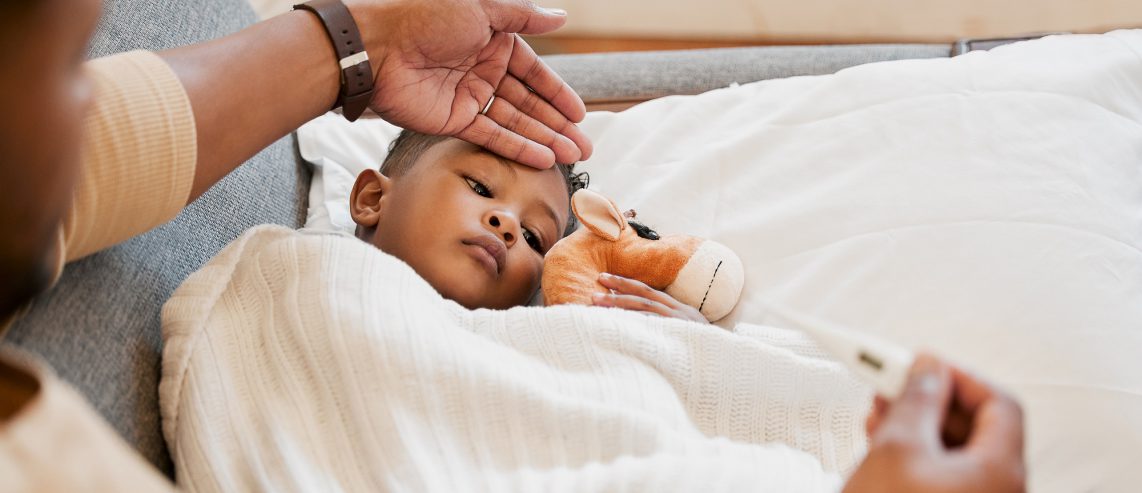It’s normal to feel concerned when your child is throwing up or has a fever. Both are common signs of illness during childhood. But sometimes, it’s hard to gauge how sick your child is.
So, how do you know when it’s okay to treat your child’s illness at home? When should you call the doctor? And when should you go straight to the emergency room (ER)?
Here are some tips on when to treat your child’s vomiting and fever at home and when to seek medical help.
Never Miss a Beat!
Subscribe to Our HealthBeat Newsletter!
Thank you for subscribing!
You can now select the specific newsletters you'd like to receive.
You are already subscribed.
Subscribe to more newsletters in our email preference center.
Sorry, an error occurred. Please try again later.
Get Healthy Tips Sent to Your Phone!
Vomiting in Children
Most children vomit from time to time, and it’s usually not a serious problem. Vomiting means they throw up the contents of their stomach. It often goes along with stomach pain, nausea, and diarrhea.
Common causes of vomiting in children include:
- Food poisoning.
- Gastroenteritis (viral or bacterial diseases commonly called stomach flu).
- Motion sickness.
When to treat vomiting at home
You can treat most cases of mild vomiting at home. If your child has a stomach bug, vomiting usually goes away in about 24 hours.
Encourage your child to rest and give them small sips of a rehydration solution like Pedialyte (or a similar store brand). You can give older children electrolyte popsicles to replenish fluids. Once your child has stopped vomiting, you can give them small amounts of plain foods like crackers or toast.
If you have questions or concerns, it’s always best to call your child’s pediatrician for advice.
When to go to the ER for vomiting
Sometimes, vomiting can be a sign of a more serious problem, and you need to seek medical help right away.
In general, you should take your child to the ER for vomiting if they:
- Are also running a fever of more than 102 degrees Fahrenheit.
- Are dizzy or lightheaded.
- Are vomiting blood or their vomit is green or brown.
- Complain of a headache or stiff neck.
- Had a head injury before the vomiting began.
- Are a baby and have a sunken soft spot on top of their head (fontanel).
- Have been vomiting for more than 24 hours.
- Have severe stomach or back pain.
- Haven’t peed for more than 8 hours (or had at least 3 wet diapers in 24 hours).
- Are showing signs of dehydration, like reduced tears, dry mouth, cracked lips, lethargy, or dizziness.
Fever in Children
Fever is the body’s normal response to fighting an infection. Fever in children is common and usually isn’t cause for concern. A fever can be good because it’s a sign that your child’s immune system is working well to fight off infection.
However, a long-lasting or high fever can indicate many problems. Keeping a close eye on your child when they have a fever is vital.
When to treat fever at home
For children, a fever means any temperature higher than 100.4 degrees Fahrenheit. You can usually treat a fever at home. But you should still call your pediatrician for advice.
Your doctor may suggest children’s strength acetaminophen (Tylenol) or ibuprofen (Advil) for children over 6 months. (You should never give a child aspirin as it might cause Reye syndrome, a rare but serious disorder.)
Babies don’t have well-developed immune systems, so infant fevers can be more serious. If your infant has a fever, you should call your pediatrician.
When to go to the ER for fever
A high or persistent fever could be a sign of a serious problem. You should go to the ER for a fever if your child:
- Has a fever of more than 102 degrees Fahrenheit.
- Has a seizure.
- Has swelling or redness anywhere on their body.
- Has been in a very hot place (like an enclosed car).
- Has purple spots on the skin.
- Is drooling a lot or having trouble swallowing.
- Is sluggish or unresponsive.
- Is younger than 3 months and has a temperature of more than 100.4 Fahrenheit.
- Looks very sick.
- Won’t nurse or bottle feed.
- Won’t stop crying.
- The fever doesn’t go down with fever-reducing medicines.
When in Doubt, Trust Your Gut
If your child is having a true medical emergency, don’t hesitate to go to the ER. Rest assured that you know your child better than anyone else. If something doesn’t seem right to you, it is worth checking out.
Here are some tips for going to the ER:
- Be ready to relay your child’s symptoms calmly and what led to the ER visit.
- Bring your child’s medical history (known allergies, any surgeries) and a list of medicines they take.
- Bring your health insurance card.
- Call your child’s pediatrician. The ER may send your doctor’s office a report after the visit.
- If possible, head to a pediatric ER. The staff there are experts in treating acute problems in children.
- Know your pediatrician’s name and contact information.
- Leave other children at home if possible.
- Recognize that you may have to wait for some time. ER staff treat the sickest people first. If your child isn’t in a life-threatening situation, it may take a while to see a doctor or nurse.
- Let your child know what to expect. You can say something like, “we’re going to wait here for a while. Then the doctor will look at you and help you feel better.”
- Stay as calm as possible. The ER can feel scary and chaotic to a child, especially when not feeling well. Your child will take their cues from you.
Sources
Kidshealth.org, Vomiting, Link
Kidshealth.org, Going to the Emergency Room, Link
American Academy of Family Physicians, When Does My Child Need Emergency Services? Link
American Academy of Pediatricians, Fever: When to Call the Pediatrician, Link
American Academy of Pediatricians, 10 Things for Parents to Know Before Heading to the ER, Link
American College of Emergency Physicians, Top 10 ER Tips for Parents, Link
American College of Emergency Physicians, Fever in Children, Link
CDC, If Your Child is Not Feeling Well, Link
MyHealthAlberta.ca, Nausea and Vomiting, Age 11 and Younger, Link
About Pediatrics
From nutrition to illnesses, from athletics to school, children will face many challenges growing up. Parents often will make important health care decisions for them. We hope to help guide both of you in that journey. UPMC Children’s Hospital of Pittsburgh is a national leader in pediatric care, ranking consistently on U.S. News & World Report’s Best Children’s Hospitals Honor Roll. We provide expert treatment for pediatric diseases, along well-child visits, urgent care, and more. With locations across Pennsylvania, Maryland, and West Virginia, you can find world-class care close to home. We also work closely with UPMC Magee-Womens Hospital, a national leader in care for newborns and their mothers. Our goal is to provide the best care for your children, from birth to adulthood and beyond. Visit our website to find a doctor near you.

